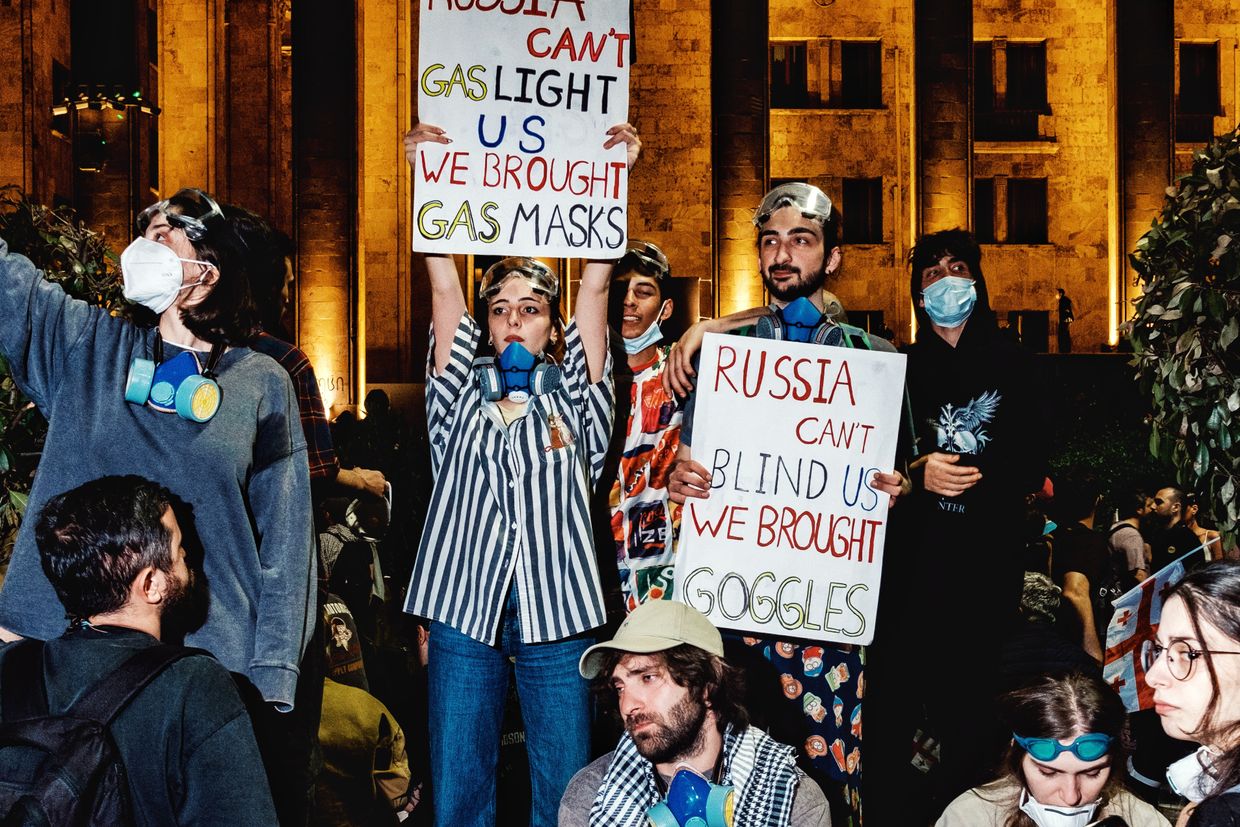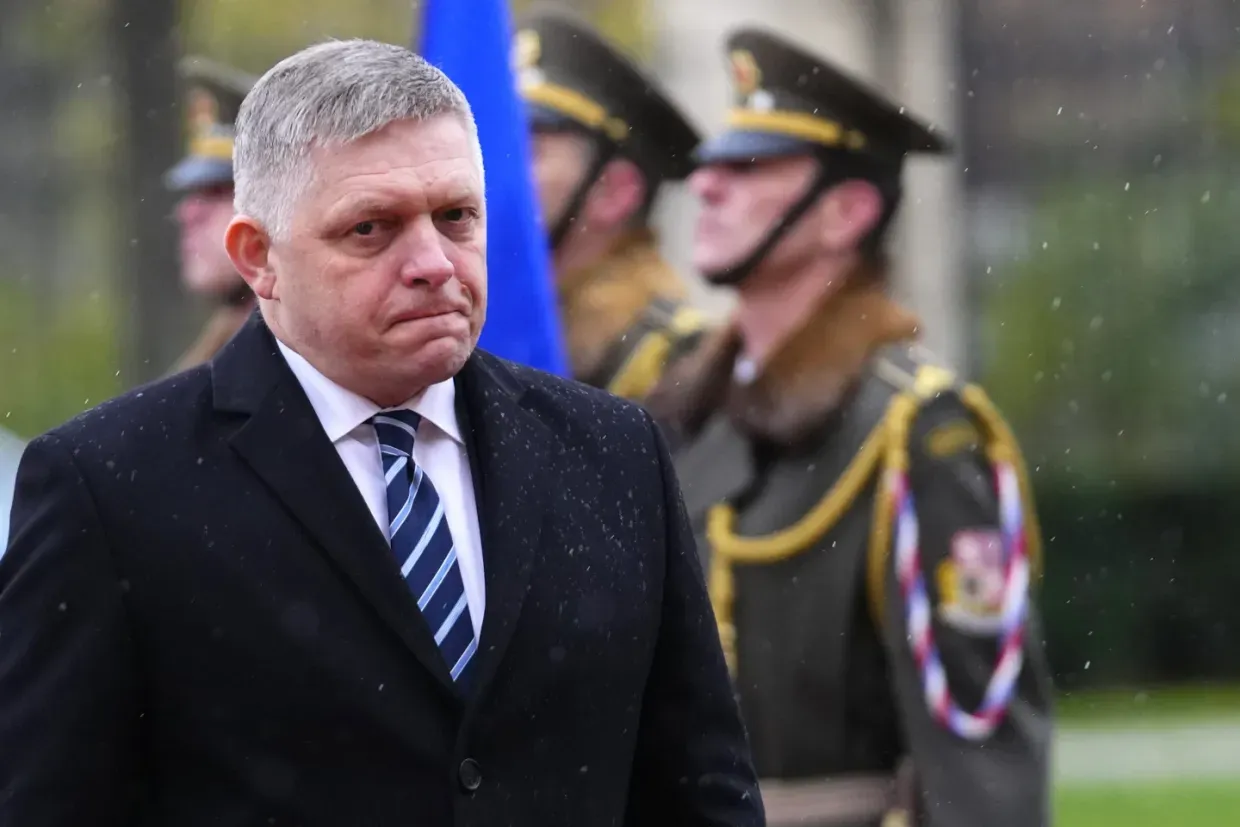On a knife-edge: Slovak PM shooting widens societal rift, feeds disinformation

A man displays a newspaper article detailing the attack on Slovakian Prime Minister Robert Fico outside the F. D. Roosevelt University Hospital on May 16, 2024, in Banska Bystrica, Slovakia. The title says: "We pray for you, Robert!" (Zuzana Gogova/Getty Images)
In an unprecedented and shocking event, Slovak Prime Minister Robert Fico was grievously injured when an attacker fired several shots at him in the town of Handlova after a government meeting on May 15.
Fico remains hospitalized in "serious condition," and the motive of the detained suspected attacker, identified by the Slovak media as 71-year-old Juraj C., is only being investigated.
The assassination attempt escalated the already palpable tensions permeating Slovak society.
Some of Fico's allies have rushed to lay the blame on their political rivals or the media.
"Anger, rage, hate, this is the result of your work - the progressives, the entire opposition, the liberal media… The guilt of the progressives and all of the liberal media will never be washed away," said Lubos Blaha, a senior lawmaker from Fico's Smer (Direction) party, at a press conference.
Andrej Danko, the leader of the right-wing Slovak National Party (SNS), which is Smer's junior partner in the government, said the shooting put his party in a state of political war and also blamed the media, attacking the liberal Dennik N media outlet as "disgusting pigs."
The two provided no grounds for their accusations, and opposition leaders and the country's media categorically denounced the attack.
According to Matej Simalcik, a Slovak political analyst and executive director of the Central European Institute of Asian Studies, pro-government actors may use the incident to push their illiberal agenda, such as a crackdown on the public broadcaster or Slovakia's own version of a "foreign agents" bill.
"By blaming the media and the non-governmental sector, they gain arguments, or rather pseudo-arguments… to push through with these policies," Simalcik told the Kyiv Independent. He added that they might seek to present their steps as "in the supposed interest of security."
Fico's critical stance toward arming Kyiv has also been used by disinformation actors at home and abroad in an attempt to find a "Ukrainian trace" and fan anti-Ukrainian sentiments, though with varying success.
Fodder for disinformation
The motive of the suspected attacker remains unclear, though Interior Minister Matus Sutaj Estok said the assassination attempt was politically motivated.
In a non-dated video that appeared on social media and was verified by Reuters, the suspect is seen saying, "I do not agree with government policy."
The suspect, Juraj C., was seen in the company of the radical Russia-linked paramilitary called Slovak Conscripts, which he praised. He also founded an organization called the Movement against Violence.
Almost immediately after the attack, Russian propaganda channels and pro-Kremlin social media accounts launched what the Wired magazine described as a "seemingly coordinated campaign" to link the attack to Ukraine.
While there is absolutely no evidence to back up this claim, the Kremlin propaganda machine was using Fico's criticism of Ukraine to lay the blame on Kyiv or its supporters.
Wired wrote that the disinformation campaign included bot accounts linked to the so-called Doppelganger network and over 100 Russian-language pro-Kremlin Telegram channels.
The narrative was also publicly backed by Russian officials and public figures.
"Is it really surprising that for the first time in decades in Europe, there was an assassination attempt against a PM who held a sensible stand on Russia?" said Dmitry Medvedev, Russia's former president and the current deputy security council сhair known for his waspish comments.
Similar messaging was adopted by conspiracy theorists in other countries, including the U.S.
After the shooting, American radio show host and conspiracy theorist Alex Jones shared an article on his social media with the headline "Slovakia would veto Ukrainian membership in NATO, prime minister says ahead of Kyiv visit" while asking a rhetorical question: "I wonder who would want him dead."
I wonder who would want him dead. https://t.co/E4Ef8JMDAp
— Alex Jones (@RealAlexJones) May 15, 2024
"We can assume that this disinformation is tailored primarily for the domestic Russian audience, but it is also spilling over to the Slovak information scene through various Telegram channels," said Matej Kandrík, the executive director of the Adapt Institute think tank, in a comment for the Kyiv Independent.
Experts say, however, that the Ukrainian link has not taken a strong hold in Slovakia.
"Some websites tried to make the connections, but it hasn't taken hold," Jana Kazaz, a researcher at the Slovakia-based think tank Globsec, told the Kyiv Independent.
At home, disinformation narratives have sought to link the incident with the media or political opposition parties, Kazaz said.
According to Kandrík, the narratives are shifting to the version, which was not excluded by local law enforcement agencies, that the attacker was not working alone, and delve into his earlier activities.
"The core messaging copies and strengthens the government's line of argument that the attack was a result of a hateful campaign by the media, journalists, and the opposition," he added.
Slovakia on edge
The assassination attempt took place in an already highly polarized socio-political climate, with tension accumulated by years of internal and external crises.
"Polarization was always quite strong in Slovakia when compared to other countries in Central Europe," political scientist Peter Spac told the Kyiv Independent, adding that tensions had escalated in the past 10 years.
"We can see this societal split running across various topics, including domestic policies – as we can see in connection to the government's reforms of criminal law – and foreign policy," Simalcik added.
In 2018, Fico resigned from his post as prime minister in the wake of the assassination of investigative journalist Jan Kuciak and his fiancee, Martina Kusnirova.
Before his murder, Kuciak was investigating suspected connections between Italian organized crime and Slovak politicians and officials, including some in Fico's office. The prime minister rejected any such links, but in March 2018, following mass protests, he handed over the reins of power to Peter Pellegrini, the current president-elect.
The tragic episode dealt a heavy blow to Fico's Smer party, which was ousted in the 2020 election and replaced by a coalition government led by centrist-populist OLaNO. The change brought no stability, however, as the new cabinet was forced to run a three-year stint marked by Covid-19, the fallout of the Russian war against Ukraine, economic challenges, and political turmoil.
Disillusion with the government's performance was one of the key factors that propped Fico back into power in the 2023 elections.
The other crucial element was the returning prime minister's capitalization on the population's fears and anxieties, related to the economy and Russia's war next door.
Smer politicians also launched vigorous attacks against the media, their political opponents, and liberal President Zuzana Caputova, not shirking from personal attacks and outright lies. They denounced liberal and progressive values as new "liberal fascism" and took up anti-Ukrainian, anti-Western, and pro-Russian rhetoric.
In fact, this has been a staple of a certain segment of Slovak politics for a long time. Spac said personal attacks against opponents have become a common tool rather than an exception.
"For several parties, polarization, hatred, and all these negative emotions have become a fundamental way to mobilize their voters," he added.

Upon returning to power, Fico's cabinet materialized many of his opponents' fears. The new government lowered penalties for corruption and abolished a specialized prosecutor's office that was investigating high-profile cases dating to Fico's previous term in power.
Ruling parties are also pushing forward a bill labeling foreign-backed NGOs, drawing comparisons to similar legislations in Hungary, Georgia, or Russia.
Fico's cabinet has backed a new bill that would shut down and reform the country's public TV and radio broadcaster RTVS, in a move seen by critics as a way to take control over the public media.
These steps sparked a wave of mass demonstrations in Bratislava and other cities, organized by the opposition parties and underscoring the growing division in society.
Mobilizing support
Outgoing head of state Zuzana Caputova and president-elect Peter Pellegrini, who is seen as Fico's ally, made a joint statement in which they denounced the assassination attempt as an attack against democracy.
The two suggested holding an all-party meeting to calm the situation, though Pellegrini recently said the "time is not yet ripe" for such a meeting as "some politicians are unable to self-reflect even after such a tragedy."
On May 21, the Slovak parliament unanimously adopted a declaration that called on politicians, media, and the non-governmental sector to avoid "hateful rhetoric" and work toward social stability and peace.
Spac points out, however, certain caveats in the declaration.
"Parts of this declaration call on political parties, the media, and others to accept the results of the elections," Spac said, explaining that the government has previously presented recent demonstrations as an attempt to undermine the recent elections.
"Then there is the question of what do you describe as 'hateful.' We can easily imagine that the opposition will raise some objective criticism regarding some government policies, and a ruling party… will say, 'don't spread hate, you yourself promised not to do it, why do you increase tensions?" Spac said.
The Slovak society thus finds itself between a rock and a hard place: on the one hand, facing the danger of ever-increasing societal tension that already lead to violence, and on the other hand, a tacit blackmail used to exhort compliance with the government's policies in the name of "social reconciliation."














